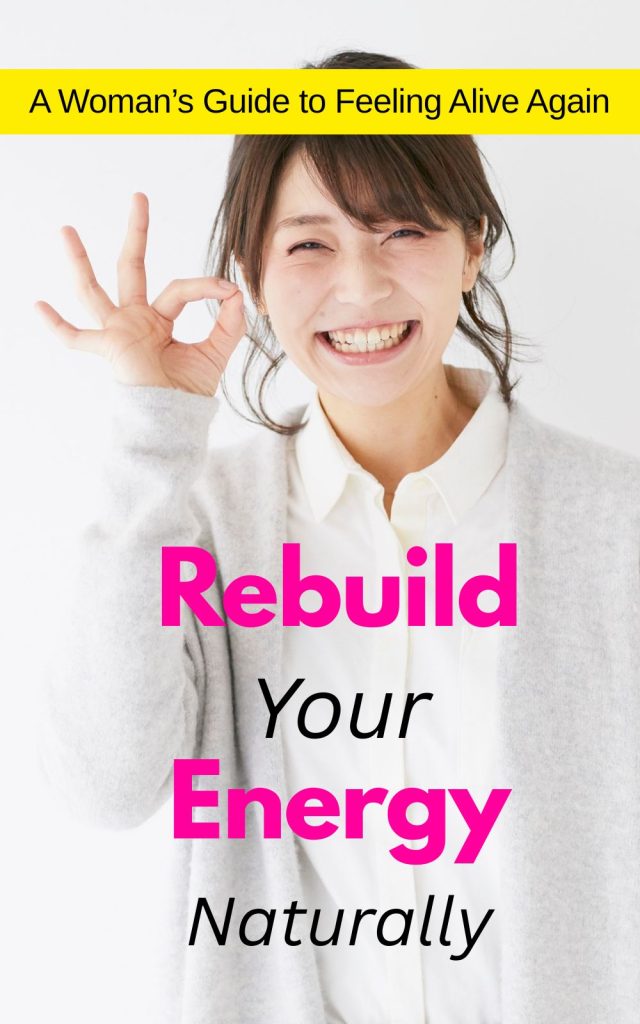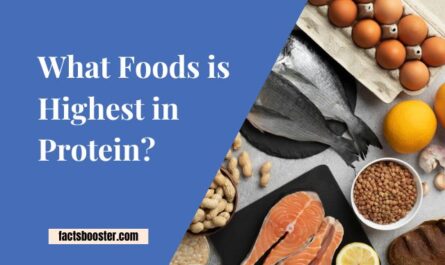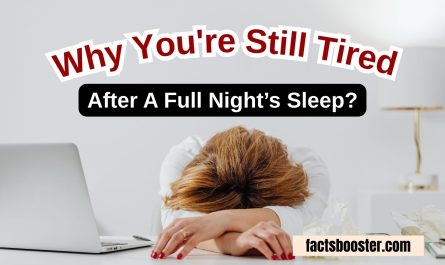You know that feeling when you’ve slept a full eight hours but still wake up like you’ve been hit by a truck? Your eyes are scratchy, your hands and feet feel like ice cubes, and no amount of coffee seems to make a dent. Your to-do list keeps getting longer while your motivation keeps getting shorter, and suddenly the hobbies you used to love feel like just another chore. If this sounds familiar, it’s time to rebuild your energy naturally instead of pushing through with another espresso shot.
Here’s the truth many women over forty don’t hear enough: you’re not broken, and you’re not just “getting old.” Your body is trying to tell you something important. It’s waving a white flag, asking for real nourishment and rest, not another caffeine boost or productivity hack.

Signs Your Energy Is Running on Empty
The warning signs usually start small. You might brush them off at first, thinking you just need more coffee or a better night’s sleep. But when they stick around, your body is trying to tell you something important.
Physical signs:
- You feel exhausted even after sleeping a full eight hours
- Your skin looks pale, dull, or lifeless
- Your lips have lost their natural color
- Your hands and feet are cold all the time, regardless of the temperature
- Your sleep is light and unsatisfying—you wake up multiple times or can’t fall into deep rest
- Your digestion feels sluggish, slow, or uncomfortable
Emotional and mental signs:
- Anxiety creeps in more often, sometimes for no clear reason
- You’re more irritable or snap at people over small things
- Waves of sadness hit you out of nowhere
- Your brain feels foggy—focusing is hard, and remembering simple things takes real effort
- Decision-making feels overwhelming, even for minor choices
For women specifically:
- Your menstrual cycle becomes irregular or changes in unexpected ways
- PMS symptoms feel more intense than usual
- You notice shifts in your cycle timing or flow
These aren’t just random annoyances. They’re your body’s SOS signals—gentle warnings that you’re running on low power. When you ignore them, they don’t magically disappear. Instead, the fatigue digs deeper, and the symptoms multiply. But here’s the good news: recognizing these signs is actually the first step toward turning things around.
What’s Really Going On With Your Energy?
Think of your body’s energy system like a bank account. For years, you’ve been making withdrawals—staying up late, skipping meals, juggling a million responsibilities, pushing through stress. At some point, the account runs dry. That’s when fatigue stops being occasional and starts being your new normal.
Your body runs on two things: the spark that keeps you going (think of it as your internal battery) and the deep reserves that keep you warm, focused, and emotionally balanced. When both are running low, you feel it everywhere.
Why Women Hit This Wall
The juggling act never stops. Between work deadlines, family needs, and that mental checklist that never quits, your stress hormones stay elevated. You’re simultaneously exhausted and wired, like you’ve had too much coffee but also need a nap.
Your eating schedule is all over the place. Grabbing breakfast on the go, working through lunch, snacking on whatever’s convenient, eating dinner at 9 PM—your digestive system doesn’t know whether it’s coming or going. And when digestion suffers, energy production tanks.
Your emotions are stuck. When you bottle up stress, worry, or frustration because there’s “no time” to deal with it, that emotional energy gets trapped. You might feel it as tightness in your chest, unexplained bloating, or periods that suddenly change.
Sleep quality drops. You’re scrolling your phone until midnight, your bedroom is too bright or too warm, and your brain won’t shut off. Even when you do sleep, it’s light and unsatisfying.
Hormones shift. After forty, estrogen and progesterone naturally decline. This isn’t a disease—it’s a transition. But it does affect how efficiently your body produces and moves energy through your system.
Understanding these patterns is powerful because it means you can actually do something about them.
How to Rebuild Your Energy Naturally Through Food
Let’s start with what you’re eating, because food is literally your body’s fuel source.
Your body recovers faster when you feed it warm, substantial meals on a regular schedule. We’re talking soups loaded with vegetables, slow-cooked stews, roasted root vegetables, brown rice, quinoa, and good proteins like chicken, fish, or beans. These foods are easy to digest and packed with the nutrients your body actually needs.
Add warming spices to your cooking—ginger, cinnamon, turmeric, black pepper. They help circulation and make your metabolism more efficient. Meanwhile, go easy on the iced coffee, frozen smoothies, and cold salads, especially in the morning. Your digestive system works best with gentle warmth, not a shock of cold.
Here’s something most women don’t realize: your digestion is the engine that converts food into usable energy. If that engine is sputtering, it doesn’t matter what you eat. So eat sitting down, not standing at the counter. Chew your food thoroughly instead of inhaling it between meetings. Put your phone away during meals. If you often feel bloated or sleepy after eating, try sipping warm water with fresh ginger or lemon—it’s like giving your digestion a gentle nudge.
Movement That Actually Helps You Rebuild Your Energy Naturally
Exercise shouldn’t leave you destroyed. If your workouts are draining you for the rest of the day, they’re not serving you right now.
Instead, try gentler movement that opens up your breath and gets your blood flowing without burning through your reserves. A thirty-minute walk around your neighborhood. A beginner yoga class. Tai chi in the park. Even dancing in your kitchen counts. The goal is to feel energized afterward, not like you need a three-hour nap.
Movement helps your body circulate everything it needs—oxygen, nutrients, hormones—to the places that need them. It also clears stagnant stress from your system. You don’t need to train for a marathon; you just need to move your body with kindness.
Calming Your Mind So Your Energy Can Rest
Your energy follows your attention. If your brain is spinning 24/7, your body never gets the signal that it’s safe to rest and repair.
Before bed, create a simple wind-down ritual. Take a ten-minute warm foot soak with Epsom salts. Write down what’s on your mind so it’s not rattling around in your head all night. Try slow breathing: breathe in through your nose for four counts, hold for a moment, then breathe out for six counts. Do this for five minutes and watch your nervous system shift gears.
The goal isn’t to have zero thoughts. It’s to create space between the thoughts so your body can finally exhale.
Sleep: Your Secret Weapon to Rebuild Your Energy Naturally
If you’re not sleeping before midnight, you’re missing out on your body’s prime repair window. Those hours between 10 PM and 2 AM are when your system does its deepest restoration work—rebuilding hormones, repairing cells, processing emotions.
Dim your lights after sunset. Keep your bedroom cool and dark. Put your phone in another room or at least turn it face-down across the room. Your body needs the message that the day is done and it’s time to heal.
Stop thinking of sleep as wasted time. Sleep is when your body rebuilds the energy you’ll spend tomorrow.
Daily Rituals That Make a Real Difference
Small, consistent habits beat big dramatic changes every time. Try these:
Morning: Start with a mug of warm water with fresh ginger. Do some gentle stretches. Take three deep breaths by an open window before you dive into your day.
Afternoon: After lunch, take a ten-minute walk. Roll your shoulders. Give your eyes a break from screens by looking at something far away.
Evening: Soak your feet in warm water for ten minutes. Put your phone away an hour before bed. Spend a few quiet minutes just breathing.
These aren’t luxury spa treatments. They’re basic maintenance for a body that’s been running on fumes.
Let Your Emotions Move
Energy doesn’t just flow through your muscles and blood—it flows through your emotions too. When you bottle things up, that stuck energy affects everything from your digestion to your sleep to your mood.
Talk to a friend. Write in a journal. Cry if you need to. Laugh until your stomach hurts. Find ways to let what’s inside actually move through and out instead of building up pressure.
Finding Your Way Back
Real, lasting energy doesn’t come from doing more things or trying harder. It comes from finding your natural rhythm—the balance between action and rest, between giving to others and receiving for yourself, between doing and simply being.
When you nourish your body with real food, move it gently, give it proper rest, and let your emotions breathe, something shifts. The heaviness starts to lift. Your eyes look brighter. Your step feels lighter. You start recognizing yourself again.
So here’s your invitation: rebuild your energy naturally, one small choice at a time. The vitality you’re looking for isn’t hiding in another supplement or productivity hack. It’s already inside you, waiting for you to create the conditions for it to flourish again. When you do, you’ll rediscover that lightness and joy you thought were gone for good—not from another cup of coffee, but from deep within your own body.

References
- World Health Organization (WHO). (2013). WHO Traditional Medicine Strategy 2014–2023. Geneva: World Health Organization.
– Recognizes the role of traditional and natural approaches in improving energy balance and managing chronic fatigue. - Harvard Health Publishing. (2022). Fatigue: Why am I so tired all the time? Harvard Medical School.
– Discusses common causes of fatigue in women and lifestyle-based recovery strategies. - National Institutes of Health (NIH). (2021). Menopause and fatigue: How hormonal changes affect energy levels. Office on Women’s Health.
– Explores how hormonal fluctuations after age 40 contribute to low energy and mood changes. - Mayo Clinic. (2022). Fatigue: Causes and natural treatments. Mayo Clinic Proceedings.
– Provides medical insights into chronic tiredness and evidence-based, non-pharmacological recovery methods. - American Psychological Association (APA). (2019). Stress and women’s health: How emotional overload impacts the body.
– Explains how long-term stress and emotional strain affect energy, immunity, and hormonal balance. - National Center for Complementary and Integrative Health (NCCIH). (2023). Mind and body approaches for fatigue and well-being.
– Reviews evidence for mindfulness, yoga, and gentle exercise in restoring energy naturally. - Journal of Women’s Health. (2020). “Chronic Fatigue and Hormonal Shifts in Midlife Women: A Cross-Sectional Study.” Journal of Women’s Health, 29(4), 512–520.
– Clinical data linking low energy, sleep issues, and hormonal changes during perimenopause. - Johns Hopkins Medicine. (2021). The gut–energy connection: Why digestion affects how you feel.
– Explains how digestive health supports energy metabolism — paralleling TCM’s “spleen-stomach” concept. - University of California, Berkeley. (2020). The power of rest and gentle movement: Restoring vitality without burnout.
– Emphasizes balanced rest, slow breathing, and low-impact exercise for sustainable energy restoration. - World Journal of Clinical Cases. (2021). “Integrative approaches to fatigue management: Bridging Eastern and Western perspectives.” WJCC, 9(21), 5897–5906.
– Reviews research integrating traditional energy-based medicine with modern fatigue management.


